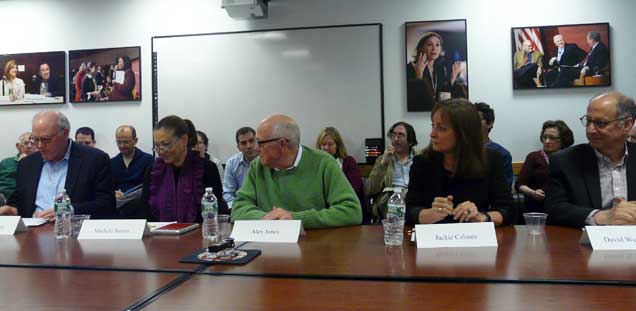April 21, 2015 — The Shorenstein Center closed its spring semester event series with a conversation with the Spring 2015 Joan Shorenstein Fellows: William E. Buzenberg, former executive director of The Center for Public Integrity, Jackie Calmes, national correspondent for The New York Times, Michele Norris, NPR host and special correspondent, and David Weinberger, senior researcher at Harvard’s Berkman Center.
Shorenstein Center Director Alex Jones opened the conversation by asking the fellows to reflect upon their work at the Center and what they have learned.
Buzenberg said he came to the realization that there is a serious need for journalism that is organized on a global level to investigate transnational institutions, companies, and NGOs. Environmental and financial stories cross borders, he said, yet the majority of news outlets use a model based on “one institution based in one country” for global coverage. For his forthcoming paper, Buzenberg has been researching organizations that promote journalistic collaboration, such as the International Consortium of Investigative Journalists and their recent Swiss Leaks project, which was a collaboration of 170 reporters working in 45 countries to report on HSBC’s illegal activities.
Norris led a series of five student study groups during the semester, exploring changing racial and cultural demographics in the U.S., and their impact on politics, policy and pop culture. She also interviewed journalists, government leaders, and people who submitted to The Race Card Project to understand how the narrative around race in the U.S. has changed in ways that were “masked by the first draft of history.” Norris said that with the election of an African-American president, the media was “focused on a notion of America entering an allegedly post-racial status,” although it became apparent from other recent developments – from demographic changes to civil unrest – that this was not the case.
Calmes said that after 30 years of covering Washington, D.C., she wanted to explore the transformation she had seen in the Republican Party. She discovered that there was a great proliferation of conservative media, from local talk radio figures to online media, some of which “promote themselves as more conservative than Fox [News].” She also found that although President Obama is a common target, conservative media outlets are “arguably more critical of Republicans than they are of Democrats,” with a number of Republican leaders who used to be seen as “rabble rousers” now being “derided” for being too centrist.
Weinberger has been researching the use of APIs in news organizations. In 2008, NPR, The New York Times, and The Guardian created open APIs – and although dreams of a community of developers building upon their metadata didn’t really come to fruition, Weinberger found that all three organizations are “ecstatically happy with what these APIs did for their organizations internally.” They are able to easily publish content across a variety of platforms – from iPads to Google Glass, he said. APIs have also enabled strategic partnerships for content sharing with other organizations.
Hear the fellows discuss the outlook for the 2016 presidential race, campaign finance, cultural and technological collaboration across news organizations, the changing lens of race relations in the U.S., and journalism education in the full audio recording above.
Article and photo by Nilagia McCoy of the Shorenstein Center.


